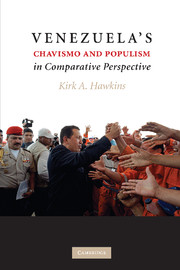Book contents
- Frontmatter
- Contents
- List of Tables
- Preface
- Acknowledgments
- 1 Introduction
- 2 Chavismo, Populism, and Democracy
- 3 Measuring the Populist Discourse of Chavismo
- 4 Party System Breakdown and the Rise of Chavismo
- 5 The Causes of Populism in Comparative Perspective
- 6 Populist Organization: The Bolivarian Circles in Venezuela
- 7 Populist Policy: The Missions of the Chávez Government
- 8 Conclusion
- Appendix A The Populist Speech Rubric
- Appendix B Test of the Sampling Technique
- Appendix C Test of Interaction Effects
- References
- Index
2 - Chavismo, Populism, and Democracy
Published online by Cambridge University Press: 17 May 2010
- Frontmatter
- Contents
- List of Tables
- Preface
- Acknowledgments
- 1 Introduction
- 2 Chavismo, Populism, and Democracy
- 3 Measuring the Populist Discourse of Chavismo
- 4 Party System Breakdown and the Rise of Chavismo
- 5 The Causes of Populism in Comparative Perspective
- 6 Populist Organization: The Bolivarian Circles in Venezuela
- 7 Populist Policy: The Missions of the Chávez Government
- 8 Conclusion
- Appendix A The Populist Speech Rubric
- Appendix B Test of the Sampling Technique
- Appendix C Test of Interaction Effects
- References
- Index
Summary
With Chávez, the people rule.
Slogan in the 2000 presidential campaignTo understand Chavismo, we need to know more about the movement's origins and how it is depicted by other scholars. We also need to learn more about the basic concepts – populism, worldview, and discourse – that I will be using to describe and analyze Chávez and his movement. This chapter provides these conceptual and empirical foundations. While the emphasis of this chapter is largely on categorization, it provides the basis for and anticipates the causal arguments in subsequent chapters.
The main argument of this chapter is that the scholarly literature places Chavismo on an inadequate unidimensional spectrum of democratic procedure. Democracy, of course, is a fundamental objective for policymakers and citizens today, and in this book I employ the minimal procedural definition of democracy that many political scientists currently use: competition over ideas and candidates (“contestation”), broad participation, and at least a minimal set of rights to make these other conditions effective (Dahl 1971 ; Collier and Levitsky 1997). This is a definition centered on, though not limited to, the conduct of free and fair elections. Using this definition, we can classify Chávez's Bolivarian government as a semidemocratic regime headed in an increasingly authoritarian direction. But to see what really makes Chavismo distinct from other democratic regimes and from the previous political system in Venezuela, we must complement this behavioral or material dimension with a cultural or normative one that considers the moral justifications for democracy. This dimension is defined primarily by two political worldviews or discourses: populism and pluralism.
- Type
- Chapter
- Information
- Publisher: Cambridge University PressPrint publication year: 2010

